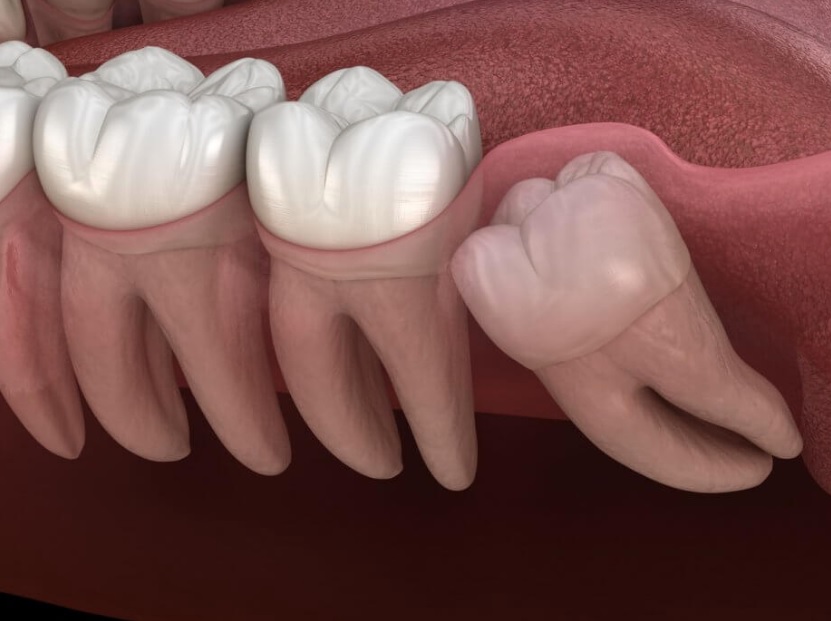Wisdom Tooth Removal Parramatta
Wisdom teeth seem to be the one thing that patients fear about at every dental visit. After the hardship of growing all the adult teeth and losing the baby teeth, the latest worry is the wisdom teeth and whether they ‘will come out’ or are they ‘stuck’.
With videos and horror stories that surround us in social media, it is no wonder why wisdom teeth are a little bit of a mystery. Do I have to take them out? Do I have wisdom teeth? Can I leave them alone? Hopefully this article will clue you into what they are and solve that mystery.
Wisdom teeth is the common name for the third set of molars that most individuals will grow. They are usually the last set of teeth to grow after all the other permanent teeth are in and can be detected in early radiographs taken around the middle to late teenage years.
It’s expected for them to show in the mouth from the ages of 17 to 25 years roughly.
There is one thing that wisdom teeth can ensure is that they are unpredictable so when they enter the mouth may be different between individuals. It can be unpredictable whether you will need them monitored and extracted later or, that they will erupt in the mouth peacefully and left alone.
This decision is best left to your dentist and yourself at the regular 6 monthly exam and clean appointments.
Wisdom teeth will be considered for extraction when they are impacted. This usually occurs when as they grow in the mouth and there is no space for them to come up through the gums, they can push against other teeth or structures.
Some wisdom teeth even if space for them in the mouth may be growing in the wrong direction! From this, pain, swelling of the gums, tooth decay, damage to the tooth in front and gum infection (pericoronitis) can occur.
It’s because of these risks which can lead to more serious infections of the jaw that the extraction of wisdom teeth is highly recommended.
Now this is not to say that all wisdom teeth are to be extracted, but it is up to the advice of your dental team to inform and track these teeth. At Parramatta Dentistry, wisdom teeth are tracked in patients from when they first appear on the radiographs.
By doing so, we can monitor and manage as they slowly develop.
Wisdom teeth can be extracted at the dentist under local anaesthetics, and at Parramatta Dentistry we do perform wisdom teeth extractions. However, this will be up to the clinical presentation of your wisdom teeth.
Some people will have wisdom teeth that are easily accessible or have grown completely out, whilst others may have wisdom teeth still in the gums and jaw. In situations where there are impacted lower wisdom teeth, a close examination on radiographs of where they are located in the jaw is very important and may even require a small cut to be made into the gums for access.
In complex cases, your dentist may not be able to take them out at the dental office and a referral to see a specialist at a hospital may be needed. But all of this will be discussed with you at your visit.
 Tooth extraction is a procedure where the dentist removes the tooth from the patient’s jaw. There could be numerous reasons why a tooth extraction is needed. From wisdom tooth, tooth infection, tooth decay and crowding are just some of the reasons why tooth extraction is performed. Most tooth extraction procedures are pretty straightforward and quick, while wisdom teeth removal in Parramatta or broken tooth that is buried in the patient’s jaw requires more intricate procedure. At Parramatta Dentistry we have OPG and CBCT x-rays on site to view the teeth roots to address if it will be a simple or surgical extraction prior to the procedure.
Tooth extraction is a procedure where the dentist removes the tooth from the patient’s jaw. There could be numerous reasons why a tooth extraction is needed. From wisdom tooth, tooth infection, tooth decay and crowding are just some of the reasons why tooth extraction is performed. Most tooth extraction procedures are pretty straightforward and quick, while wisdom teeth removal in Parramatta or broken tooth that is buried in the patient’s jaw requires more intricate procedure. At Parramatta Dentistry we have OPG and CBCT x-rays on site to view the teeth roots to address if it will be a simple or surgical extraction prior to the procedure.
At Parramatta Dentistry, our wisdom teeth removal cost ranges from $230 – $450 depending on the complexity of the situation. For simple or straightforward wisdom teeth removal Sydney, then it will only be $250 but if surgical extraction is needed, then it will be from $350 – $450.
This is without the consideration of the consultation and radiographs that are needed to examine them.
Our dental team understands that this procedure is not something anyone is fond of and tries to price it at a reasonable rate that is accessible. For multiple teeth extraction there is a discounted amount.
For more information please contact our Parramatta Dentistry staff for more details.
After a tooth extraction in Parramatta the dentist will place a gauze on the extracted area. It is important that the patient bites down on the gauze for a good three to four hours. This is to ensure that the bleeding will stop and help the blood clot to form. Painkillers will be prescribed if needed and should be taken accordingly. Once you are at home it is advised to place an ice pack directly on the cheek for a duration of 10 minute at a time to reduce swelling.
For the next 24 hours it is advised to rest and relax while following these few steps. Avoid rinsing your mouth for the next 24 hours and if needed to spit, do so gently. If bleeding occurs again, bite down on the spare gauzes given to you at the appointment for at least 30 minutes. Do not touch or flush the area, so when you’re brushing or flossing your teeth try your best to avoid the extracted site. Soft food diets such as congee, oats, yogurt and ice cream are recommended after extraction. Drinking through a straw and no smoking while the extracted site is recovering can ensure that the tooth extraction healing goes smoothly.
After 24 hours you can start rinsing your mouth with warm salt water after every meal and brush gently on the extracted area making sure you do not dislodged the blood clot. Once the extracted area has been healed in the next couple of days, you can also start slowly reintroducing other foods into your diet. At Parramatta Dentistry we are able to print out the step by step aftercare instruction so you can refer to it while you’re at home recovering.
However if you are still experiencing pain or any sign of infection in the next couple of days after the extraction. Make an appointment at Parramatta Dentistry as soon as possible to get that treated.
Dry socket is a painful symptom that can occur after a major tooth extraction. The cause of a dry socket is when the blood clot in that area is dislodged or dissolved before the wound is healed. The exposure of the underlying bone and nerves in that site can cause tremendous pain. Patients with dry sockets should immediately seek the dentist for treatment to relieve the pain. To prevent dry socket from happening it is very important to follow the aftercare instructions given by the dentist.

